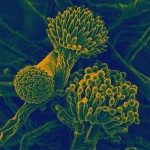Lien vers Pubmed [PMID] – 21390224
PLoS ONE 2011;6(3):e14743
BACKGROUND: Two NF-kappaB signaling pathways, Toll and immune deficiency (imd), are required for survival to bacterial infections in Drosophila. In response to septic injury, these pathways mediate rapid transcriptional activation of distinct sets of effector molecules, including antimicrobial peptides, which are important components of a humoral defense response. However, it is less clear to what extent macrophage-like hemocytes contribute to host defense.
METHODOLOGY/PRINCIPAL FINDINGS: In order to dissect the relative importance of humoral and cellular defenses after septic injury with three different gram-positive bacteria (Micrococcus luteus, Enterococcus faecalis, Staphylococcus aureus), we used latex bead pre-injection to ablate macrophage function in flies wildtype or mutant for various Toll and imd pathway components. We found that in all three infection models a compromised phagocytic system impaired fly survival–independently of concomitant Toll or imd pathway activation. Our data failed to confirm a role of the PGRP-SA and GNBP1 Pattern Recognition Receptors for phagocytosis of S. aureus. The Drosophila scavenger receptor Eater mediates the phagocytosis by hemocytes or S2 cells of E. faecalis and S. aureus, but not of M. luteus. In the case of M. luteus and E. faecalis, but not S. aureus, decreased survival due to defective phagocytosis could be compensated for by genetically enhancing the humoral immune response.
CONCLUSIONS/SIGNIFICANCE: Our results underscore the fundamental importance of both cellular and humoral mechanisms in Drosophila immunity and shed light on the balance between these two arms of host defense depending on the invading pathogen.

